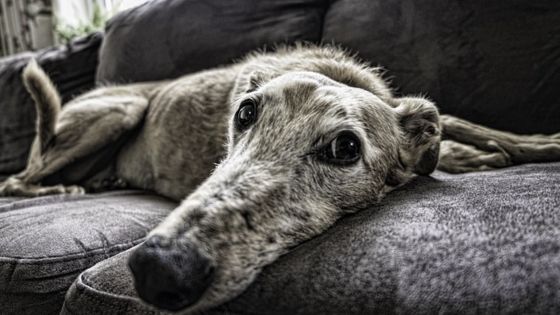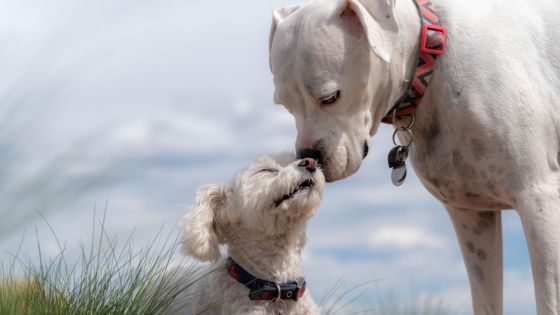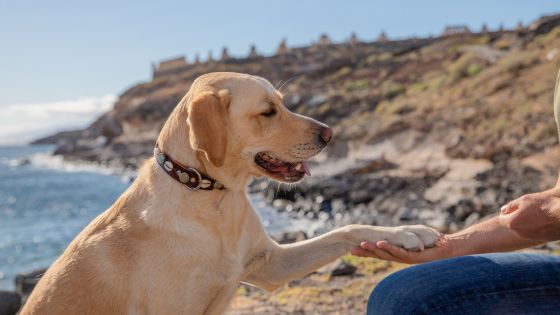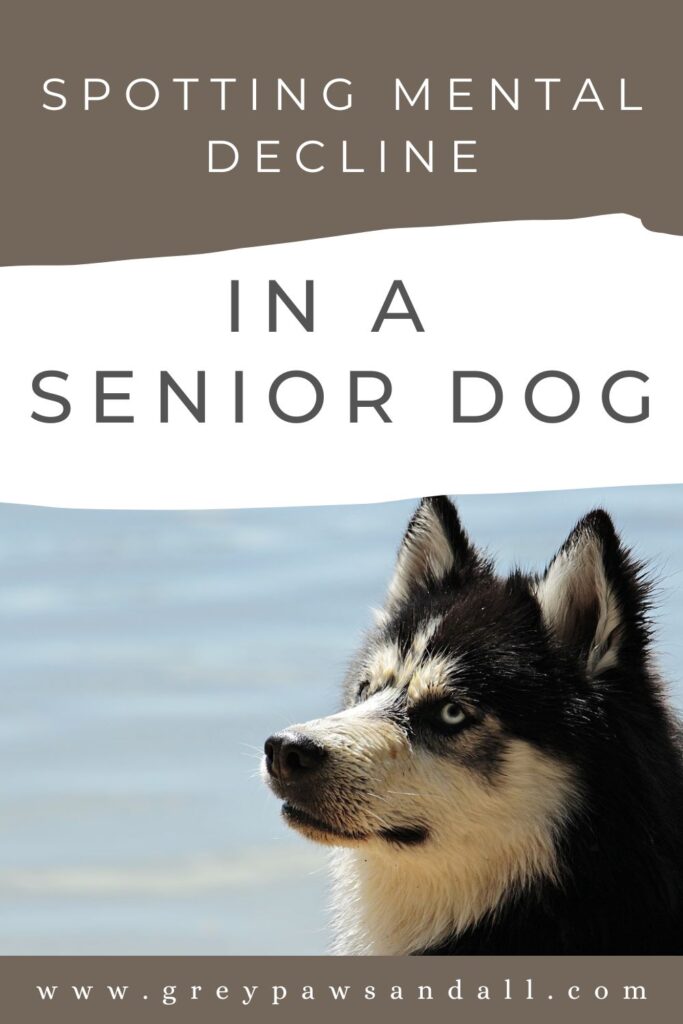Just like many humans develop dementia as they age, so do dogs. Referred to as Canine Cognitive Dysfunction (CCD), it’s not painful to your dog, but speaking from experience, it’s tough to witness. The good news is, keeping their mind active can help slow down cognitive decline and improve quality of life.
Signs of Cognitive Decline in Senior Dogs
If you notice any of these signs, your dog may be experiencing age-related cognitive changes:
Sleep and awake patterns
- Changes in sleep pattern
- Sleeps more during the day, less at night
- Wanders or cries at night
- Keeps family up at night
- Disorientation
- Performing the same behaviours over and over
- Having trouble eating or drinking
- Doesn’t respond to her name
- Doesn’t respond to cues/commands
- Wanders aimlessly/paces
- Seems lost or confused in familiar surroundings like the house or yard
- Gets stuck in corners or other tight spaces and just stands there
- Has trouble with stairs
- Stares into space or at walls
- Difficulty finding the door
- Stands on hinge side of the door
- Does not get out of the way when the door is opening
- Stands at wrong door to go out
- Does not recognize family or friends
- Gets stuck under or behind furniture
- Has difficulty learning new things
- Walks in circles, usually in one direction
Housetraining issues
- May not remember the signal to go outside
- Goes outside and just wanders, then pees and poops in the house
- Does not let you know she has to go out like she used to
- A perfectly housebroken dog seems to have forgotten her training
Interaction with family and others in your household
- Does not greet anyone, or if she does she’s less enthusiastic than usual
- Does not look for attention like she used to
- Walks away when petted
- Withdrawn from family
Anxiety
- Seems fearful and/or anxious
- Easily startled
- Barks for no apparent reason
- Aggressive but never was before
- Trembles for no apparent reason
- Afraid of people she knows

Activity level
- Less enthusiastic about her toys
- Plays less or not at all
If you’re noticing any of these signs, please make a vet appointment. There are lots of reasons for these symptoms not just dementia, so the sooner you have a diagnosis, the sooner treatment can begin.
I have a downloadable checklist in this article, for you to fill out and take to your vet.
5 Ways to Support Your Senior Dog’s Mental Health
🧩 1. Mental Stimulation & Enrichment
Puzzle and treat dispensing toys – These are a great way to challenge your dog and get him thinking. You can find them in a variety of difficulty levels, so always start off easy. If it’s too hard your dog may get frustrated and walk off.
Scent games – Hide smelly treats or use a snuffle mat to encourage sniffing, foraging and problem-solving.
New walking routes – Make walks more interesting by changing up the routes, introducing your dog to new sights and sounds.
Note: See how he or she reacts to that change, because not every dog will appreciate a different routine. If he seems anxious, go back to what’s familiar.

❤️ 2. Socialization & Emotional Support
If your pup loves meeting other dogs, or has doggie friends he likes to visit, keep those fun activities going.
Be sure to continue playing with your dog to keep him engaged, but give him quiet time if he seems to want a break.
Stick to your dog’s routine as much as possible, as they find comfort knowing what happens when.
🌙 3. Improve Sleep & Reduce Night Time Restlessness
As with sundowners in humans, dogs often sleep all day and awake when the sun goes down. That means you may be up much of the night as well.
Nightlights are a great way to help your dog navigate in the dark, and relieve anxiety. Many members of my FB group have found it a big help.
Is your dog happy sleeping where he always did? If not you may need to try a different bed or even location.
If your dog is really struggling and can’t settle, speak to your vet about possible medications that can help.

🧠 4. Training & Learning New Skills
A great way to keep your senior dog’s brain engaged is by teaching new tricks, or brushing up on old ones. They don’t have to be anything fancy (unless he’s up for it!), it could be simple things like sit and paw.
As with all training, sessions should be kept short or they get fed up and walk away.
Perhaps there’s a scent or other fun class in your area that might be suitable.
🩺 5. Consider Supplements & Medications
Calming chews, Senilife and the prescription medication selegeline (known as Anipryl in the US and Canada, and Selgian in the UK) are just a few options to help with the effects of dementia. Selgian helped my dog Red for about a year or so.
For a more detailed list, please check the articles in the resource section below.
When to See a Vet About Cognitive Decline
When it comes to senior dogs, any changes in behavior no matter how slight, warrants a vet visit. Whether it’s dementia or another cause found, an issue caught early has a much better chance of being treated and managed.

Final Thoughts
Caring for your senior dog’s mental well-being is just as important as their physical health. By providing mental enrichment, maintaining a familiar routine, and working with your vet, you can help your furry friend stay sharp, happy, and engaged in their golden years.
💬 What mental games or activities does your senior dog love? Share in the comments!
Resources
A Comprehensive Guide to Dog Dementia
Does Your Senior Dog Have Dementia
My Life as a Dog with Dementia
I am a Senior Dog Care Consultant, helping senior dog parents struggling with anticipatory grief, quality of life and health & wellness issues. I offer practical tips, advice and one on one support. I am also a Certified Pet Loss Bereavement Specialist, helping you navigate through your pet loss journey.
Click this link to book a FREE 20 minute discovery call, visit my services page to find out more or email hindy@greypawsandall.com if you have any questions.
I’ve been rescuing and caring for senior dogs since 2009. From vision and hearing loss to obesity, dementia, kidney disease, liver issues, cardiac problems, Cushing’s, mobility challenges and more, you could say I’ve dealt with and learned a lot! In addition to my hands on experience, I’ve taken many courses and earned several qualifications to keep learning how to help senior dogs and they include: Senior Dog Enrichment, Understanding Canine Anxiety, Care of the Senior Pet and I’m a Certified Pet Loss Specialist.


Great article, Hindy! It’s very complete. I love that you give a list of what to look for and how to engage a senior dog. I think keeping them engaged is so important. Sometimes Henry will keep me up at night, but it’s generally because his eye is causing him pain. So, I’ll give him a cbd cookie for pain and he sleeps like a baby. I wish I could sleep so well. I know my dog parents will find this very helpful.
Oh no poor Henry! I hope his eye issues are only temporary. They’re sleeping soundly, we’re up all night worrying, watching them breathe.
Yes! Another thing that helps both humans and animals- keeping our brains active. It’s hard watching our pups struggle with forgetfulness and mental stuff like that as they get older. Thanks for helpful tips!!
It’s very difficult watching our dogs struggle, no question about it.
Great article and I learned so much from you when Layla was still with us, I gave her snuffle toys which she loved, rides in her stroller as much as possible plus Lions Manes Mushroom Supplement from Rel Mushrooms for her Dementia which worked wonders.
You were such a great dog mom to Layla. I know how much she loved her stroller, and it’s thanks to you I also take Lions Mane. I wonder how much of a difference it would have made for Red.
This is a wonderful article. I’m thankful that none of my dogs have had cognitive issues, but I realized too late I could have helped a lot of senior dogs I worked with. One sign of cognitive decline is waiting on the hinge side of the door expecting it to open, and many senior dogs would start doing this when it was time to leave. I wish I’d known so I could have had a CCD checklist to hand off to them while checking the dog out.
Thank you! Yes that is definitely one sign of dementia, but there are so many more which is why I created a printable checklist to bring to the vet. It’s a condition not often mentioned by them, not sure why. It’s great your dogs didn’t have this experience, it’s not the easiest to deal with. We’re all learning as we go, but I understand what you mean.
CCD is so awful. My Husky, Icy, had it & it was just heartbreaking to witness. We struggled with her for about a year and managed it pretty well. You were really helpful in the information you shared with me. Thank you again for that, Hindy. Icy ultimately became physically ill, we think it was an infection that started with a bed sore. But honestly, our Vet couldn’t say for certain. She ultimately went OTRB in January. 😞
I remember posts about Icy. It really is so heart breaking to watch, I came across a video I took of Red walking in circles after her dementia diagnosis. So sad.
Such an excellent article, Hindy. My GSD/Akita “Chelsey” had this, way before they really understood what it was. She began having a lot of the symptoms you mention. Her happy place was snoozing in my daughter’s room in the sunbeams coming through the window. It was so heartbreaking seeing her mentally decline. At first, we had no idea what was happening to her, then it became clear to me she was suffering from early stages of dementia, and I spoke with my vet. We had to help her cross the bridge because she was no longer herself, she was physically in wonderful, healthy shape, but she was petrified, confused, snappy, scared, she didn’t trust anyone any more, she’d get stuck in corners, stare at the ceiling, slick thousands of circles in the rug, she’d go from being her happy self to being aggressive. It still makes me cry and she earned her wings in 2007 …just so heartbreaking. Six months after, I was at my vet’s in the waiting room with one of my Huskies for their physical, and on his TV there was information about CCD…I sat there and cried. A half a year earlier and maybe the new medicine could have helped Chelsey. I am so glad there is much info out now, and I am sharing this with my readers.
I can just picture her on the floor, lying in the sun. Too many people let their dogs just exist because they can’t bear to say goodbye. Of course it was heart breaking for you, but recognising Chelsey was no longer herself, you did the kindest thing. It must have been sad seeing that information, but like I always say, we can only do our best with the information we have in that moment. You gave her a great life, and that’s what matters.